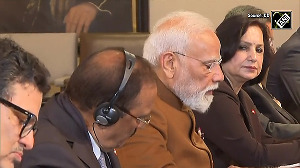Do our farmers not deserve a life of dignity? Why should farmers always bear the burden of keeping food prices and inflation low?
How many farmers in India actually earn Rs 18,000 per month, the minimum basic pay recommended by the Pay Commission for government employees, says Devanik Saha.

The recent announcement of the 7th Pay Commission by the government, due to be implemented from January 1, 2016, has brought some cheer. Finance Minister Arun Jaitley believes that this will spur growth across various sectors like automobiles, realty, consumer goods, to name a few.
Almost 48 lakh central government employees and 55 lakh pensioners are expected to benefit from the pay hike. Some provisions include: A 23.55 per cent hike in pay and allowances of government employees. Minimum basic pay now will be Rs 18,000; Maximum pay will be Rs 2.25 lakhs per month. An annual increment of three pc and 24 pc hike in pension has been recommended as well.
However, few labour unions have protested against it, arguing that the hike is not in conjunction with the rising inflation.
On the other hand, with two consecutive bad monsoons, India’s agriculture sector is reeling under drought. Last year, the sector registered a growth of only 0.2 pc.
This year, as many as nine states have declared a drought in their regions.
With successive crop failures and knee-deep in debt, farmers have been committing suicide at an alarming rate. A recent survey by Swaraj Abhiyan (led by Yogendra Yadav and Jean Dreze) of farming households in Bundelkhand revealed some appalling statistics.
In the last eight months, 38 pc of villages surveyed reported at least one death due to hunger and malnutrition. Two-thirds (67 pc) of households didn’t get or weren’t sure of eating two meals a day while 79 pc of households reported eating rice and roti with just salt or chutney on a few occasions. Sixty pc of general households haven’t consumed milk even once in the past 30 days; the same figure was 69 pc for their poorest counterparts.
Clearly, there is cause for worry.
Unfortunately, successive governments have neglected the concerns of farmers. The Bharatiya Janata Party’s inaction to combat rural distress has been attributed as one of the reasons for its recent electoral reverses in Gujarat’s rural areas and in Bihar.
Do our farmers not deserve a life of dignity? Why should farmers always bear the burden of keeping food prices and inflation low? How many farmers in India actually earn Rs 18,000 per month, the minimum basic pay recommended by the Pay Commission for government employees?
Rural India had nine crore agricultural households as of 2012-13. Assuming an average family size of four, at least 36 crore people’s lives are directly impacted by agriculture.
An average farmer in India has a surplus income of only Rs 2436 per annum (Rs 203 per month), according to Situation Assessment Survey 2014 by the National Sample Survey Organization, with the situation even worse for farmers with small landholdings.
Farmers with land sizes less than 0.01 hectare have an average annual income of Rs 54732 and annual consumption of Rs 61296, thereby, a debt of Rs 6564 each year. Compare this with the minimum pay for a government employee.
A peon will earn four times more than a farmer, apart from the several benefits he/she will be entitled to.
So what needs to be done?
Two critical measures have been suggested by experts:
Raise the Minimum Support Price: The M S Swaminathan Committee in 2006 had recommended providing 50 pc profits over the cost of production to farmers. Unfortunately, the same hasn’t been implemented yet. Earlier this year, the agricultural ministry told the Supreme Court it cannot increase the minimum statutory prices of key cereals or pulses any further, in response to a PIL filed by the Consortium of Indian Farmers Association.
National Farmers Income Commission: The committee had also recommended that the "net take home income" of farmers should be comparable to those of civil servants. While this may be too much of an ask, given the current fiscal deficit, but at least a National Farmers Income Commission should be set up to assure a small monthly income for farmers, according to farm and food policy analyst Devender Sharma. He suggests that there is a need to work out an assured monthly package for farmers, depending on his crop productivity and also the geographical location of the farm.
However, there might be some cause for cheer.
The 2016-17 Union Budget, which is due in three months, will have three or four focus themes, with agriculture being one of them. In an interview to Business Standard, Minister of State for Finance Jayant Sinha said the focus will be on crop health cards, agricultural credit, funding for state-led irrigation schemes among others.
Furthermore, in response to a Lok Sabha question, Sinha mentioned that a national crop insurance scheme would soon be introduced for the benefit of farmers.
While there have been many such schemes previously, reports and studies reveal that the implementation and impact have not been up to the mark. It remains to be seen whether 2016-17 indeed brings some change in the lives of farmers as it will for civil servants.
Image: Farmers thrash the paddy crop. Photograph: Danish Ismail/Reuters.










